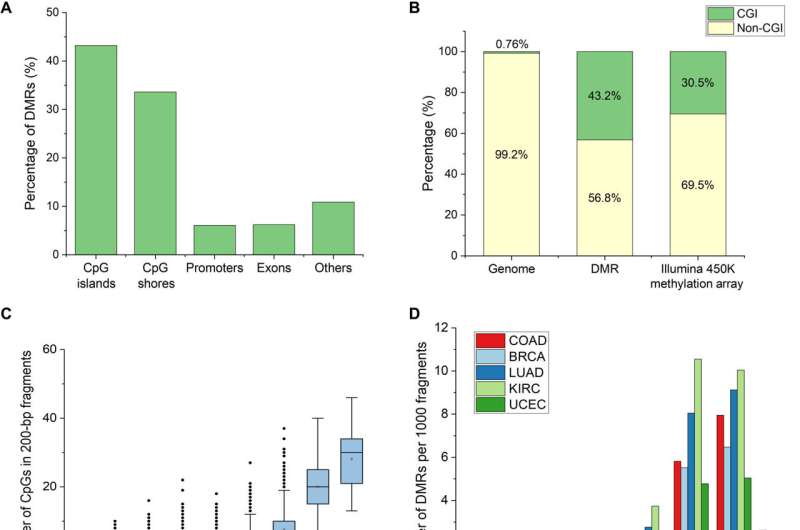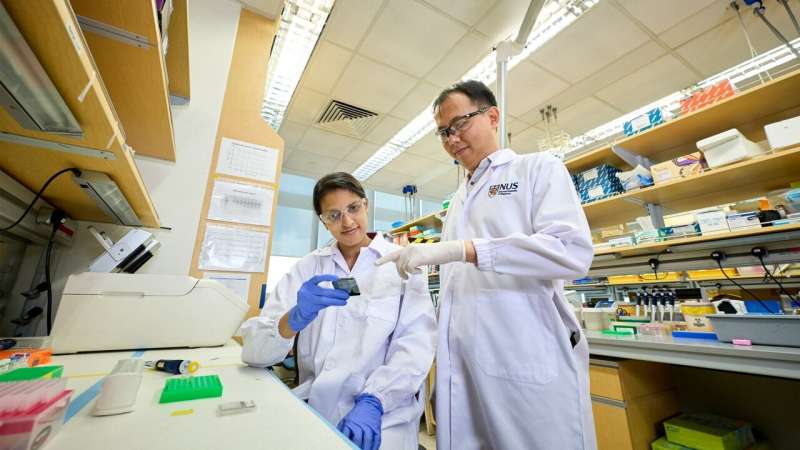CpG-rich DMRs are highly enriched in regions with high GC content. (A) Percentage of DMRs between CRC tissue and healthy plasma in different genomic regions. More than 40% of DMRs lie in CpG-rich CGIs. (B) Proportion of DMRs and Illumina 450K Methylation Array probes in CGI with respect to the genomic distribution. Forty-three percent of DMRs and 30% of Illumina 450K methylation array probes lie in 0.76% of the genome. (C) Relationship between GC content and number of CpGs in 0.5 million randomly generated 200-bp fragments from the human genome. Fragments with high GC content also contain more CpG within each fragment. (D) Number of DMRs of different cancers detected per 1000 fragments using different GC-content thresholds. COAD, colorectal adenocarcinoma; BRCA, breast invasive carcinoma; LUAD, lung adenocarcinoma; KIRC, kidney renal clear cell carcinoma; UCEC, uterine corpus endometrial carcinoma. Fragments above 0.6 GC content contain nearly eightfold more DMRs across different cancers. (E) Workflow of Heatrich-BS to select for GC-rich fragments. GC-poor fragments are denatured by heat, and intact GC-rich fragments are selected by Y-adapter ligation. (F) Trend of GC content and read enrichment at CGI over a range of temperatures. Optimal enrichment is achieved at 88°C. Credit: Science Advances (2022). DOI: 10.1126/sciadv.abn4030
Scientists from the National University of (NUS) have discovered a novel low-cost method of testing for cancers. Called the Heatrich-BS assay, this new test sequences clinical samples that have been heated in order to isolate cancer-specific signatures found in a patient's blood.
The new method provides a promising non-invasive alternative to tissue biopsies. It costs around S$50 (approximately $37 USD) from start to finish, compared to other sequencing methods that can cost up to S$1,000 to conduct. Led by Assistant Professor Cheow Lih Feng, the team comprising researchers from the NUS Department of Biomedical Engineering under the College of Design and Engineering as well as the NUS Institute for Health Innovation & Technology, is now exploring industry partnerships to bring their technology to market.
"When you have a S$50 test, it opens up a lot of avenues because it is affordable, so you can do the test quite regularly," said Asst. Prof. Cheow, pointing to the potential for their assay to be used in regular cancer monitoring.
Liquid biopsies for cancer
Current methods of testing for cancers can suffer from a lack of sensitivity or from being too expensive to be used for regular screening. The DNA in our blood, the genetic information that tells our cells how to synthesize proteins and other important biological building blocks, is produced by different organs in our body. Cancer cells also release DNA into the bloodstream that can be detected by analyzing blood samples, known as liquid biopsies. However, sifting through all the genetic material in a sample—a method called whole-genome sequencing—can be expensive and labor intensive.
Some clinicians instead target cancer-specific signatures in cell-free DNA, almost like hunting for specific faces in a large crowd of people instead of inspecting every single individual. Yet, even such methods can be imperfect, Asst. Prof. Cheow explained. "Some patients may have cancer signatures that look slightly different and allow them to slip through the screening process," he said.
Asst Prof Cheow Lih Feng (right), his former PhD student Dr Elsie Cheruba (left) and their team have developed the Heatrich-BS assay, an affordable and highly sensitive blood test for cancer. This new testing method has strong potential to be used in regular cancer monitoring. Credit: National University of Singapore
A more sensitive test at a small fraction of the price
Asst. Prof. Cheow's team has discovered a way to discard the non-informative sections in a patient's DNA to target where most cancer-specific biomarkers are concentrated.
Our DNA is made up of molecules known as nucleotides: adenine (A), thymine (T), guanine (G) and cytosine (C). Cancer-specific signatures tend to be concentrated in areas of the genome that have high repetitions of C and G nucleotides, known as CpG islands, that make up only around 1 percent of our genome.
"We were performing some unrelated experiments, and one of our researchers heated a sample," Asst. Prof. Cheow said, recounting the team's accidental discovery that heat destroyed non-informative sections of the genome, but left CpG island largely intact. This allowed them to sequence the remaining genome and detect the presence of cancers for a minute fraction of the average market price.
"We are getting a much more sensitive assay at almost the same costs as compared to simple protein biomarker tests," he said, "Our method really concentrates on sequencing these regions that matter the most."
The NUS team published their findings in the scientific journal Science Advances on September 9, 2022, and a patent has also been filed for their discovery.
Benefiting patients, doctors and scientists
The Heatrich-BS assay has been trialed at the National Cancer Center in Singapore, monitoring patients with colorectal cancer. By comparing the results of their blood analysis with CT scans that imaged the size of patients' tumors, the team found that there was a high correlation between how much cancer-specific DNA was detected in a patient's blood sample and the size of their tumors over time.
"This way, doctors can monitor patients for their response to treatment and tailor their therapy regimes," Asst. Prof. Cheow said. He also pointed out that their method has the potential to work universally across all types of cancer since they all demonstrate the property of enriching CpG islands with cancer-specific biomarkers. "It's a one-size fits all," he added.
The assay may also help accelerate future academic research, helping scientists study different subtypes of cancer for a low cost and therefore improving the development of future cancer diagnoses and therapies.
Asst. Prof. Cheow and his team are now exploring ways to commercialize their assay by partnering with pharmaceutical and biotechnology companies that can help bring the Heatrich-BS assay to market. "We are excited about our results and licensing discussions are underway," he said.
More information: Elsie Cheruba et al, Heat selection enables highly scalable methylome profiling in cell-free DNA for noninvasive monitoring of cancer patients, Science Advances (2022). DOI: 10.1126/sciadv.abn4030
Journal information: Science Advances
Provided by National University of Singapore
























